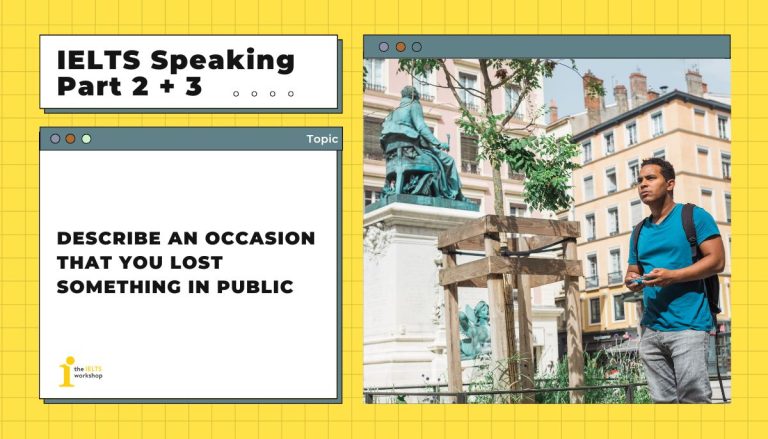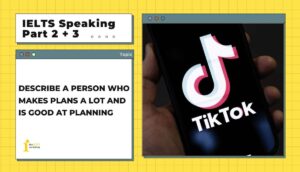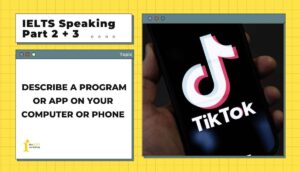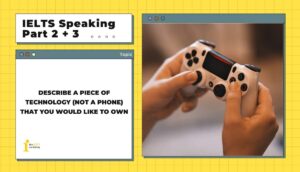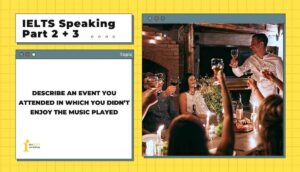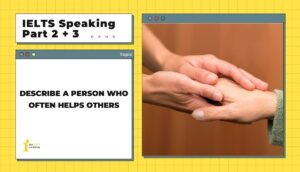Trong chuyên mục giải đề IELTS Speaking kỳ này, cùng tham khảo chủ đề: “Describe an occasion that you lost something in public” qua bài mẫu của cô Kiều Trinh của The IELTS Workshop dưới đây nhé.
Part 2: Describe an occasion that you lost something in public
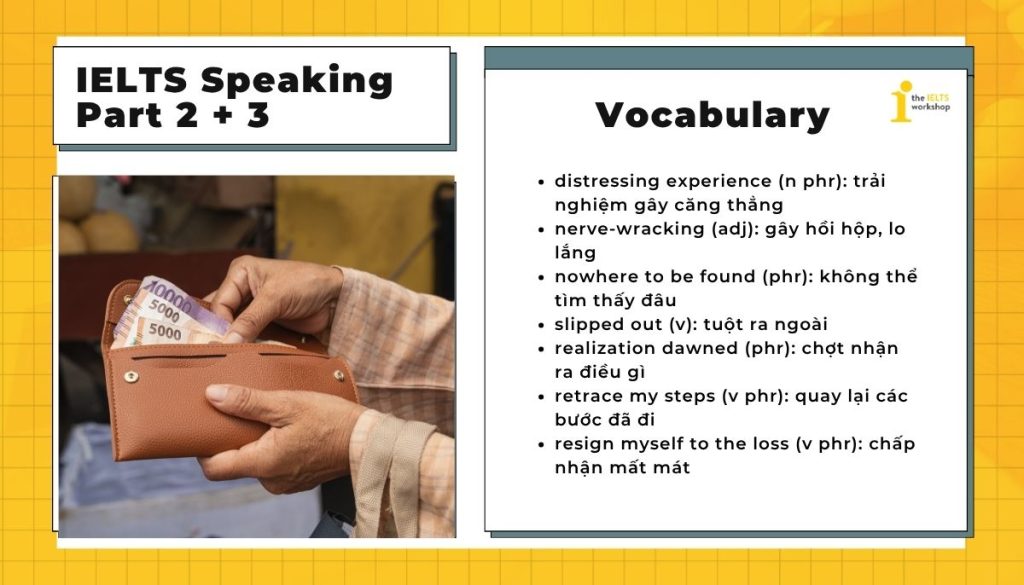
Dưới đây là bài mẫu cho topic “Describe an occasion that you lost something in public”.
1. Bài mẫu (Sample)
Well, I think everyone at some point has had a pretty distressing experience of losing something valuable in public. For me, it happened about a year ago during a weekend trip to Da Nang, when I lost my wallet in the middle of a bustling night market.
We had just finished dinner and were walking around, checking out the stalls, trying local snacks, and enjoying the atmosphere. I remember reaching into my bag to pay for a drink and suddenly realizing my wallet was nowhere to be found. I must’ve been careless when I took my phone out, and it probably just slipped out without me noticing. As the realization dawned, I felt a wave of anxiety and helplessness washing over me. I was far from home, and everything, including my ID, bank cards, cash, was gone.
Trying not to panic, I immediately retraced my steps, hoping I might spot it on the ground, or someone might have picked it up. I even asked a few vendors if they had seen it, but nothing turned up. At that point, I was about to resign myself to the loss, when one of my friends suggested checking the lost-and-found booth near the entrance.
To my surprise and relief, someone had actually handed it in, with everything still intact. I couldn’t believe it. It was one of those moments when you feel like a weight has been lifted off your shoulders. More than that, I was genuinely touched by that act of civic honesty from a complete stranger.
In hindsight, it was a huge wake-up call for me. I’ve become much more vigilant in public since then, especially in crowded places. And oddly enough, that one bad experience actually reaffirmed my belief in human integrity. Sometimes, it takes losing something to remember that not all is lost, especially your faith in people.
Sample by Kieu Trinh, IELTS Teacher at The IELTS Workshop
2. Từ vựng (Vocabulary)
- distressing experience (n phr): trải nghiệm gây căng thẳng
- nerve-wracking (adj): gây hồi hộp, lo lắng
- nowhere to be found (phr): không thể tìm thấy đâu
- slipped out (v): tuột ra ngoài
- realization dawned (phr): chợt nhận ra điều gì
- retrace my steps (v phr): quay lại các bước đã đi
- resign myself to the loss (v phr): chấp nhận mất mát
- lost-and-found booth (n phr): quầy nhận đồ thất lạc
- civic honesty (n phr): sự trung thực nơi công cộng
- vigilant (adj): cảnh giác
- integrity (n): chính trực, liêm chính
- a weight lifted off my shoulders (idiom): như trút được gánh nặng
- wake-up call (idiom): bài học cảnh tỉnh
Xem thêm: Describe a foreign country you would like to explore in the future | IELTS Speaking Part 2 + 3
Part 3
- How can parents help children to be organized?
- What kinds of people may lose things often?
- What can we do to prevent losing important things?
1. How can parents help children to be organized?
That’s an interesting question. I think parents play a pivotal role when it comes to shaping their kids’ habits. One of the most effective ways is to create a clear and consistent routine, like having set times for doing homework, having meals, or even bedtime. Over time, this kind of structure helps children develop organizational competence without even realizing it. Also, instead of just telling children what to do, parents should lead by example. If kids see their parents modeling good behavior, like using calendars, making to-do lists, or keeping things tidy, they’re more likely to follow suit. And of course, positive reinforcement, like praising them when they clean up after themselves, goes a long way in reinforcing these habits.
- pivotal role (n phr): vai trò then chốt
- consistent routine (n phr): thói quen đều đặn
- organizational competence (n phr): năng lực tổ chức
- model good behavior (v phr): làm gương
- positive reinforcement (n phr): sự củng cố tích cực
2. What kinds of people may lose things often?
Hmm, well, in my opinion, people who are absent-minded or just constantly juggling too many things tend to lose stuff more often. For example, someone with a hectic lifestyle who’s always multitasking might forget where they put their keys or phone. I mean, it happens to all of us, right? On top of that, individuals who live in cluttered environments or don’t have a fixed spot for their essentials are more likely to misplace them. Also, I’ve read that people with neurodiverse conditions, like ADHD, sometimes struggle with memory retention and spatial awareness, which makes it harder to keep track of things.
- absent-minded (adj): đãng trí
- multitasking (n): làm nhiều việc cùng lúc
- cluttered environment (n phr): môi trường bừa bộn
- neurodiverse conditions (n phr): các tình trạng thần kinh khác biệt
- memory retention (n phr): khả năng ghi nhớ
- spatial awareness (n phr): nhận thức không gian
3. What can we do to prevent losing important things?
Well, to be honest, I think preventing this starts with developing simple yet effective systems. Like, always putting your keys in the same place when you get home, it may sound basic, but it really works. Creating designated spaces for your belongings is key. Also, I personally use a few tech tools like tracking devices or reminder apps. They can be lifesavers, especially when you’re in a rush or feeling scatterbrained. But above all, staying present and mindful is crucial. If we’re too distracted or mentally elsewhere, we’re more likely to misplace things without even noticing.
- designated spaces (n phr): khu vực được phân định rõ
- tech tools (n phr): công cụ công nghệ
- tracking devices (n phr): thiết bị theo dõi
- scatterbrained (adj): hay quên, đầu óc lộn xộn
- present and mindful (adj phr): hiện diện và chú tâm
Sample by Kieu Trinh, IELTS Teacher at The IELTS Workshop
Xem thêm: Describe something you do to keep fit and healthy | IELTS Speaking Part 2 + 3
Tạm kết
Chủ đề “Describe an occasion that you lost something in public” không chỉ kiểm tra khả năng kể chuyện và miêu tả chi tiết của bạn, mà còn đánh giá cách bạn xử lý tình huống và sử dụng ngôn ngữ một cách linh hoạt. Hy vọng rằng bài mẫu và từ vựng gợi ý trong bài viết đã giúp bạn có thêm ý tưởng để tự tin xử lý những đề tài bất ngờ trong phòng thi.
Đừng quên khám phá thêm KHO BÀI MẪU IELTS SPEAKING và Bộ đề dự đoán IELTS Speaking Quý 2 (T6 – 08/2025) – Full 3 Parts của để luyện tập đa dạng chủ đề và chuẩn bị thật kỹ trước ngày thi nhé!
Đăng ký học IELTS MIỄN PHÍ ngay tại: HỌC IELTS MIỄN PHÍ


